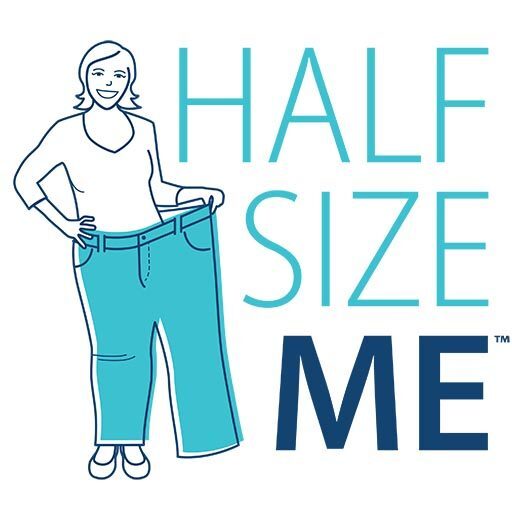To get support, try The Half Size Me™ Community for ONLY $1! CLICK HERE to learn more!
One of the things I love most about working as a weight loss coach is I get to help people recognize the thoughts and beliefs preventing them from making progress in their journey. I help my clients create plans of action to get them unstuck. Of course, just because I do this for others doesn’t mean I always remember to do it for myself.
Sometimes I find myself in a similar trap. The only difference is I’ve learned how to be more aware of what I’m doing. I’ve learned how to set boundaries with myself and create habits that help rather than hurt me. For awhile now I’ve half-heartedly attempted to return to my goal weight of 150 pounds.
And as I write this post I’ve reached the top end of my maintenance goal weight, also known as my “scream weight,” of 160 pounds.
But I’ve started noticing unhelpful patterns in my own behavior. These include repetitive self-sabotaging thoughts like “You can start tomorrow,” or “It’s just this one meal,” or “it’s only 10 pounds”.
I’ve also noticed I’ve been lacking the motivation and interest to do the work necessary to lose the weight. However, after losing 170 pounds and keeping it off for almost four years, I can see these patterns forming and I acknowledge when they’re happening. I’m human, and far from perfect.
I know what to do, but just like you I sometimes fall into the same complacency. However, after reading a post from Katie at KatieRunsForCookies.com and listening to an interview with Leigh Peele on Jay Scott’s Full Disclosure podcast, I was reminded of all I’ve learned over the past few years. Both of these wonderful resources really spoke to me, and they helped me in two different areas I’ve wanted to improve.
So I decided to do some internal work and coach myself. And then I created a plan of action to move myself out of my rut.
The first idea was from Katie’s blog post. It helped remind me I needed to “get it over with”. All the time I wasted thinking about getting back to my goal weight would stop if I did the work. If I take action rather than think about it, then my mind is freed up for more important things. This also reminded me of how much of my younger years, especially my 20s, I spent obsessing about losing weight.
During this time, I never made any real progress, but I was always on or off a diet. I was busy, but not productive and I spent ten years getting nowhere. So, I’ve decided I don’t want to waste any more mental space thinking about this situation. I have a choice: either let go of the desire to lose ten pounds and accept a higher goal weight, or do the work and lower my weight. I can’t have both at the same time.
And because part of me is unwilling to accept staying at the higher weight this leaves one option: lose the weight. Compared to the original 170 pounds I lost, 10 pounds doesn’t seem like much. And yet, because it is easy to dismiss it as “only 10 pounds” it also makes it harder to lose.
I’ve fallen into this rationalization trap before. Back then, I justified gaining back all the weight I’d lost in high school, because it was only 5 pounds at a time. Before I knew it, I’d gained back the original 80 pounds I’d lost— and a lot more. But now I’m different. Taking ten to 15 weeks to lose this weight is a small investment in my future, not a punishment that makes me feel resentment, which is how I used to view it.
The other idea I was reminded of by both Katie’s post and Leigh’s interview is my eating does not have to be perfect during this process. If I can maintain my calorie deficit, I can also have food I enjoy. Eating foods I like as a way to get me through the calorie deficit is more important than making sure my macros are balanced each day.
I’ve held myself back from doing the work because I’ve distracted myself. I’ve focused on the things that won’t help me get to where I want to be. It’s easy to take in too much information and lose sight of the “big rocks,” or the things that really matter and will make the biggest difference.
So, if I focus on eating food I like and staying in a calorie range that works for my goals, I won’t have to stress about every thing else. Most of the little rocks, the things that don’t matter as much, will take care of themselves.
Another podcast episode that helped me see this more clearly was the Sigma Nutrition podcast (http://sigmanutrition.com/episode43/). In this episode, Dr. Mike Israetel shared a list of things, from most important to least important, you can do to change your body’s composition through nutrition.
It’s interesting that the first two areas on the list account for almost 80% of the potential body change you experience by focusing on nutrition. Here’s a summary of Dr. Israetel’s five key points for the diet hierarchy to change your body composition (as shared by Dr. Israetel in the Sigma Nutrition podcast episode 43):
- Set your calorie intake according to your goals
- Macro nutrient with protein being prioritized
- Nutrient timing
- Food composition, including type of protein, type of carbs, type of fat
- Supplements
I do believe there can be such a thing as too much information. I’ve seen many of my clients struggle with over thinking their goals. They struggle with what they think they should be doing, so they end up not doing anything at all. I realized I’d been doing this too. I was over complicating what I was eating.
When I think back on where I was mentally while losing 170 pounds, I realize I blocked out all outside distractors. I kept everything simple. And I just did the work.
So now I’m going back to basics. I tell my coaching clients all the time you can know everything about nutrition, TDEE, deficits, macros, points, and working out. You can be an encyclopedia of weight loss and fitness knowledge, but you still have to do the work and live the process.
The hard part has to happen. Knowing what to do and doing it are two different things. And as I’ve learned, you have to do something different to get different results.
So here’s my three step, easy-to-follow, no-more-B.S. plan to get back on track with my goal weight:
1. Keep things simple. I’m letting go of all the worry around macros and meal timing. I’ve had too many restrictors and focal points. This has contributed to my struggle with getting back to the lower end of my goal weight. So, instead, I’m going to focus on eating in a calorie range I know will help me lose weight. If I want to achieve this goal, I need to do this.
But to help me feel more relaxed about the calorie deficit, I’m going to eat foods I enjoy. That way I won’t feel deprived. That means if I choose to skip breakfast so I can have more calories available later in the day, then I’ll do that. If I eat too many carbs or fat but still hit my calorie deficit, I won’y stress about it. The simple question I want to answer each day is “Did I hit my calorie goal for the day?”.
2. Make My Fitness Pal information private. I’m doing something I’ve never done before which is to make My Fitness Pal private. I’ve always shared my account. However, as I make the changes I need to make, I’m concerned about someone who may not be ready for it trying to copy what I’m doing.
When I started losing weight and I weighed over 313 pounds, I would have tried to copy anyone who had success losing weight. I assumed that whatever they were doing would also work for me.
But where I was then required me to follow a different process than someone who’d already lost 150+ pounds. If I tried to eat what they were eating or follow their calories, I would have failed miserably and more than likely gained more weight.
However, I have a different relationship with food now. I’ve worked on my binge eating issues and have learned delayed gratification techniques. I also learned a lot more about my hunger and fullness cues. I’ve learned a lot and my relationship with food has changed significantly.
Because I’m at a different place in my journey, I don’t want to worry someone who is just beginning their journey will copy my approach. What I need to do for myself isn’t necessarily the right approach for others, especially those just starting out.
3. Prevent myself from over exercising. I’ll keep lifting weights and walking. Just like I do now. I know over exercising makes me hungry and can interfere with my eating plan. Exercise is great but it’s not the dictating factor. When it comes to weight loss, it’s more about what I eat than how much I work out.
So, I’m going to be kinder to myself. I’m going to keep the process simple and stop over-thinking everything. I know the sooner I commit to the process and get back down to goal the better it is for my body, heart, and mind. I could waste more time, bouncing back and forth at the top end of my maintenance weight, not committing to what I really want.
But by tearing off the proverbial Band-aid and getting started I’ll relieve the frustration and concern I have about reaching the top end of my maintenance weight. I know I can do the work to be free of this problem. The choice is mine. The choice is always mine.
What about you? Do you find yourself struggling with what you really want to do versus taking the action necessary to achieve it? If so, please leave me a comment below and let me know what you’re going to do about it to change things today!

